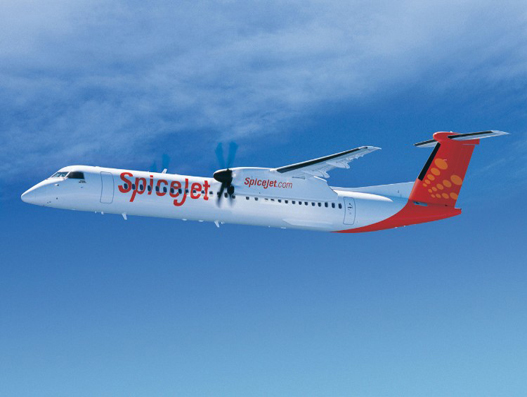
SpiceJet operates India’s first biofuel-powered flight on Dehradun-Delhi route
Aug 28, 2018: SpiceJet has operated India’s first-ever biofuel-powered flight on the Dehradun-Delhi route. With this flight, India’s aviation sector enters into a new era of using sustainable and clean technologies and also becomes one of the few countries to use biofuel for flying planes. The airline deployed Bombardier Q400 aircraft for the nearly 45 […]

Aug 28, 2018: SpiceJet has operated India’s first-ever biofuel-powered flight on the Dehradun-Delhi route. With this flight, India’s aviation sector enters into a new era of using sustainable and clean technologies and also becomes one of the few countries to use biofuel for flying planes.
The airline deployed Bombardier Q400 aircraft for the nearly 45 minutes flight that was partially powered by biojet fuel.
Highlighting the advantages of using biojet fuel that is made from Jatropha crop, the airline mentioned, “The advantage of using biojet fuel as compared to ATF is that it reduces carbon emissions and enhances fuel efficiency.”
At Dehradun, the SpiceJet fight was flagged off by Trivendra Singh Rawat –Chief Minister of Uttarakhand. The flight successfully landed in Delhi in the august presence of Nitin Gadkari – Minister of Road Transport & Highways, Shipping and Water Resources, River Development & Ganga Rejuvenation; Suresh Prabhu –Minister of Commerce and the Industry, Civil Aviation; Dharmendra Pradhan - Minister of Petroleum & Natural Gas and Skill Development & Entrepreneurship; Dr. Harsh Vardhan - Union Minister for Science & technology, Earth Sciences, Environment, Forests and Climate Change; JayantSinha - Minister of State for Civil Aviation; Ajay Singh - chairman & managing director, SpiceJet and senior government and aviation officials.
The airline intends to undertake operations using a blend of 75 percent of aviation turbine fuel (ATF) and 25 percent of BioJet fuel, which has the potential of reducing carbon footprint by 15 percent.
The fuel has been developed by the CSIR-Indian Institute of Petroleum (IIP), one of the constituent laboratories of the Council for Scientific and Industrial Research based in Dehradun. The BioJet fuel has been recognised by American Standard Testing Method (ASTM) and meets the specification standards of Pratt & Whitney and Bombardier for commercial application in aircraft.
“This fuel is low cost and helps in significantly reducing carbon emissions. It has the potential to reduce our dependence on traditional Aviation Fuel by up to 50 percent on every flight and bring down fares. India is the fastest growing aviation market in the world today and it is our responsibility to grow using clean and sustainable technologies,” said Ajay Singh, SpiceJet.
According to IATA, aviation industry contributes to 2 percent of the total greenhouse gas emissions in the world. IATA has also set out a target for one billion passengers to fly on aircraft using a mix of clean energy and fossil fuels by 2025.
Last year, SpiceJet placed an order for 205 Boeing 737 Max aircraft. The fuel-efficient Max planes are expected to reduce fuel consumption by about 15 percent. Besides, the new Max fleet will leave 40 percent lesser noise footprint.

